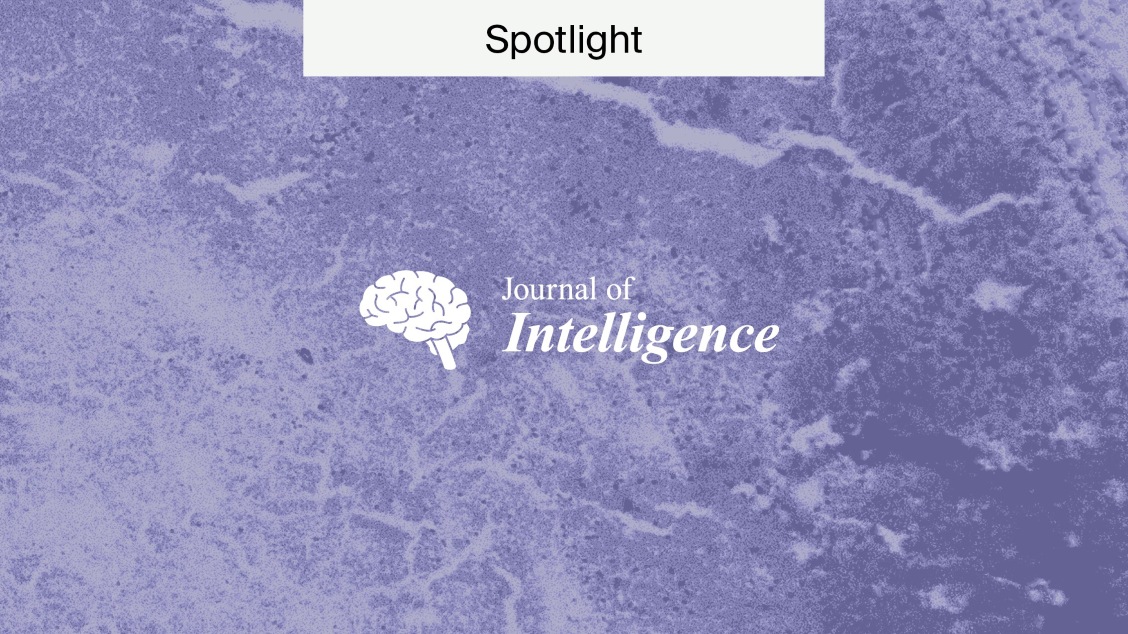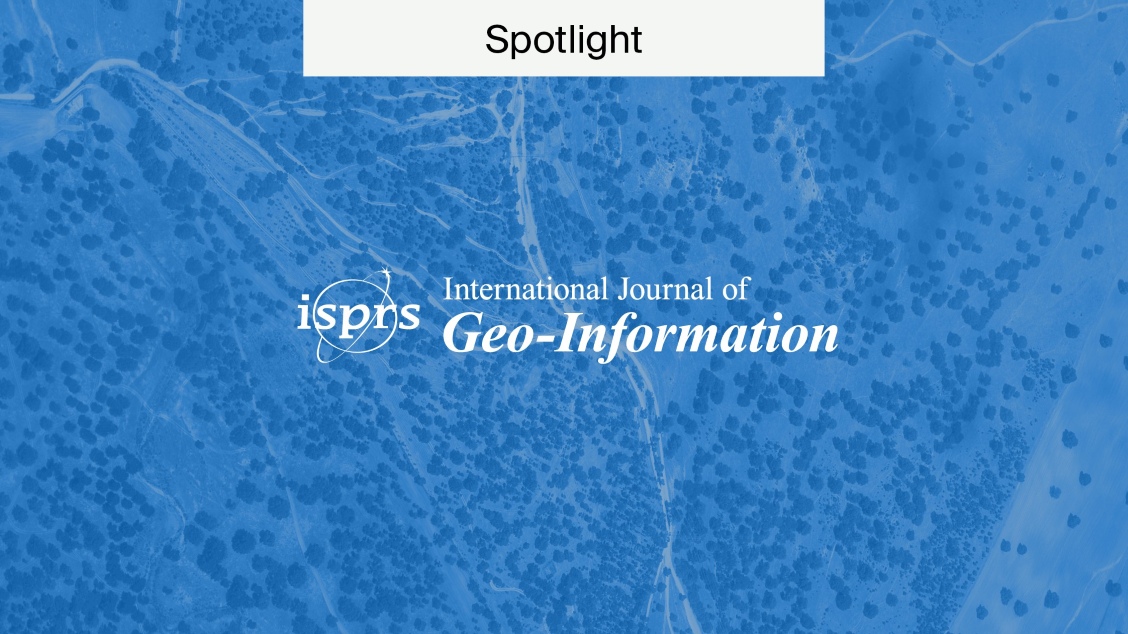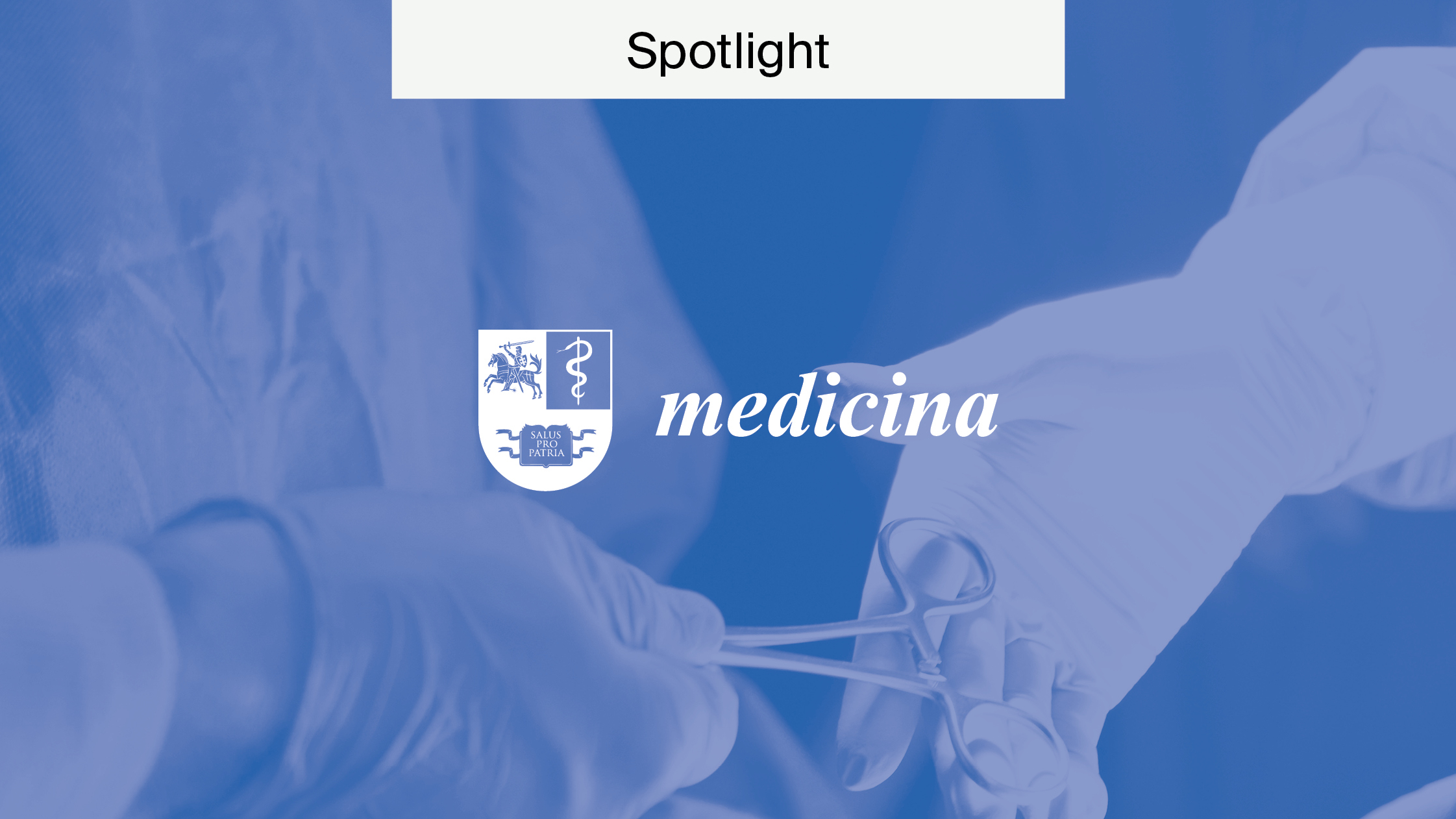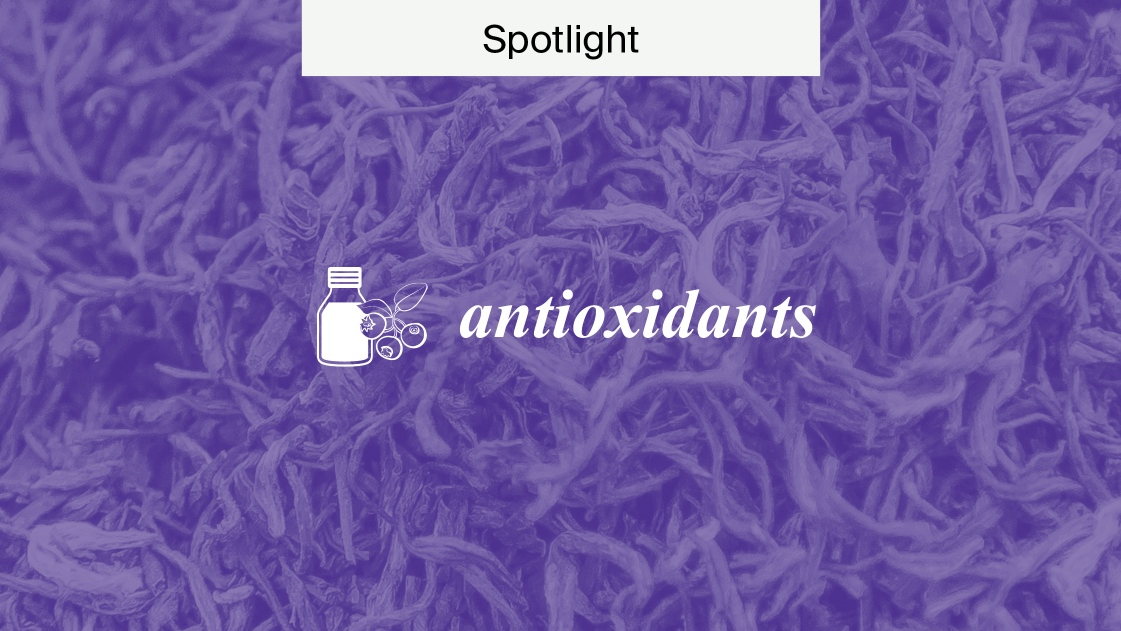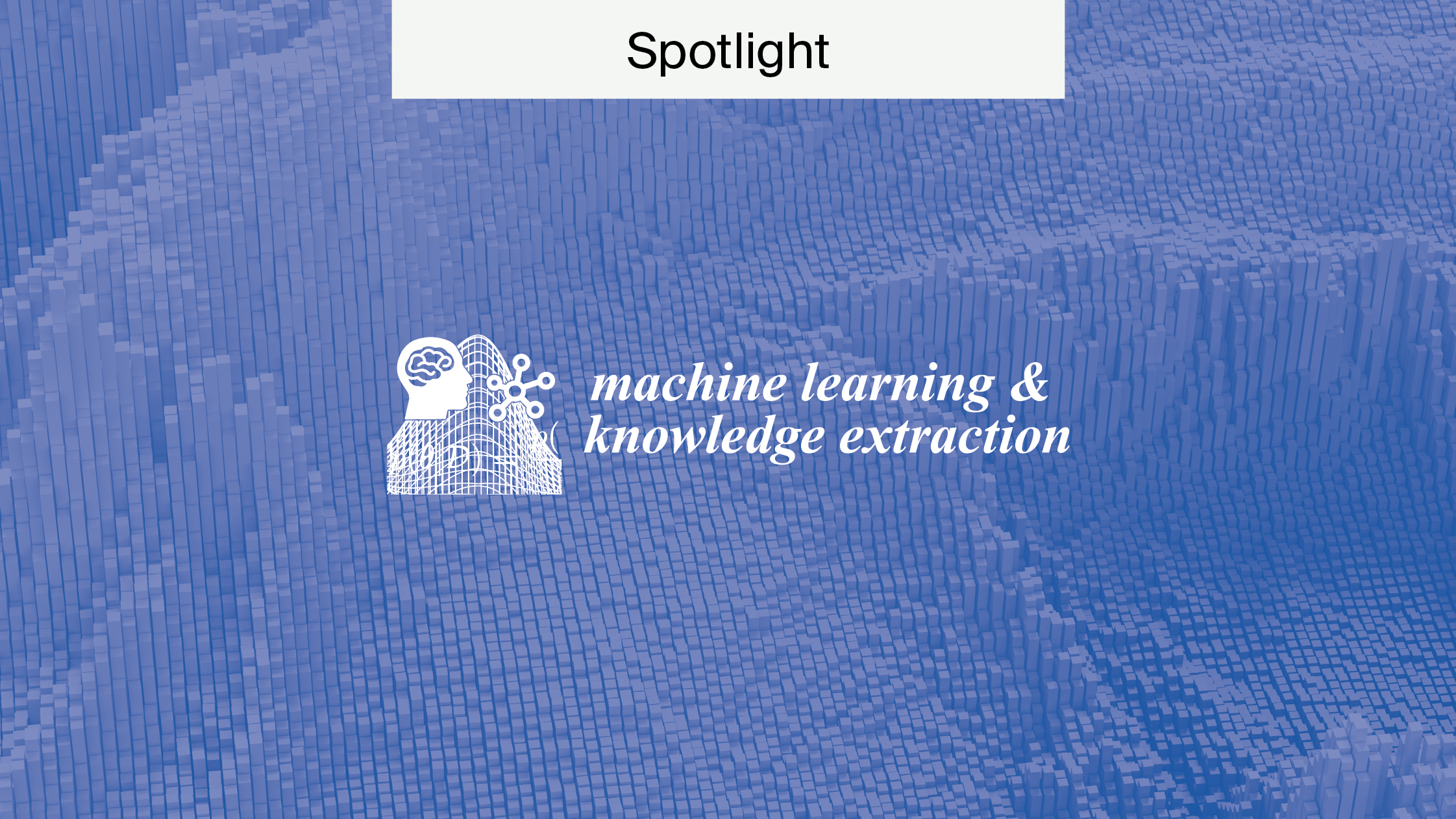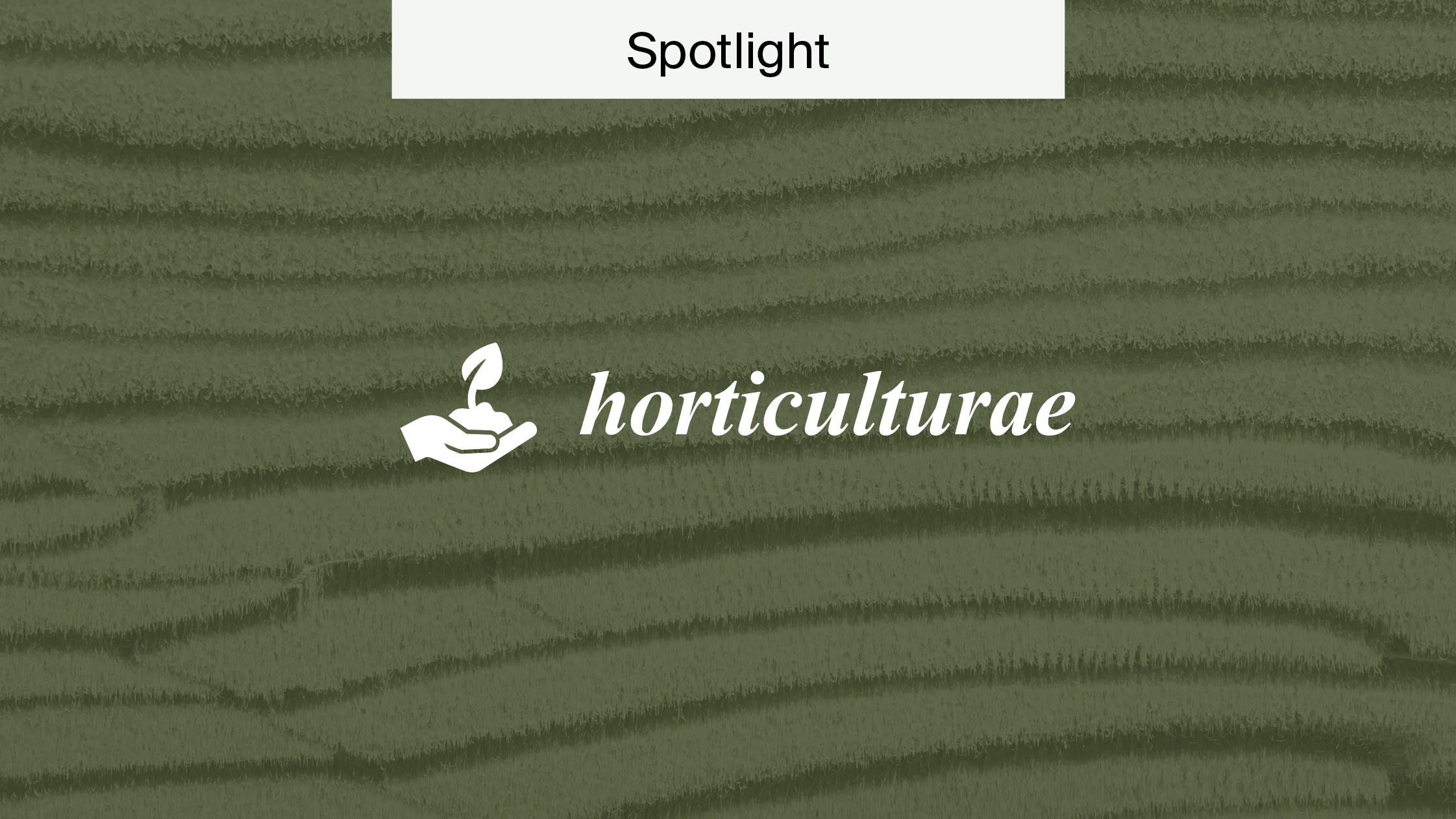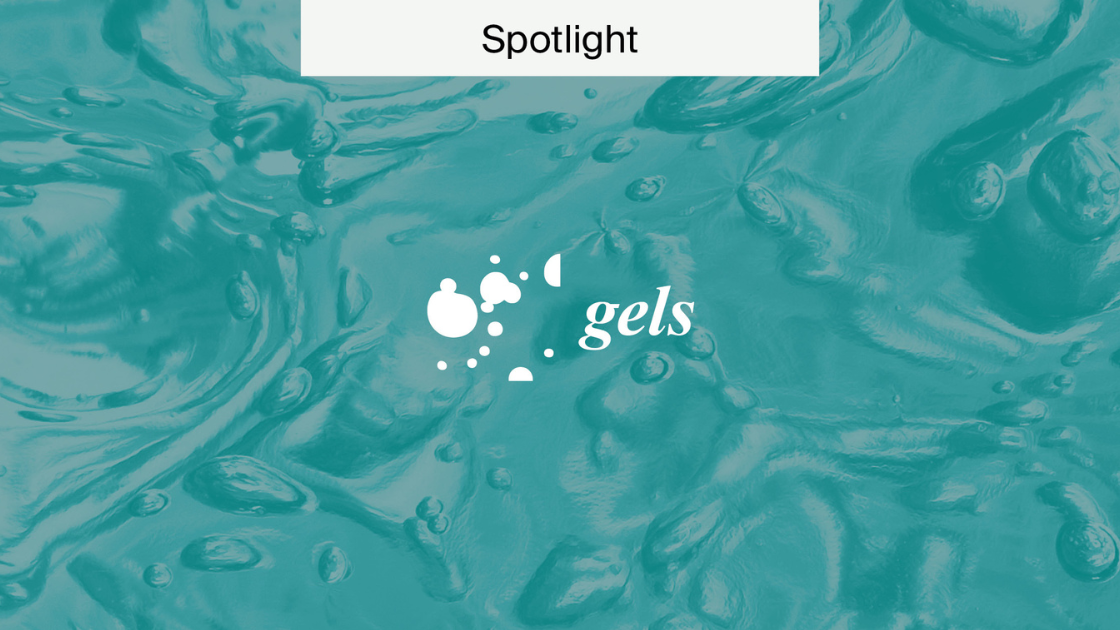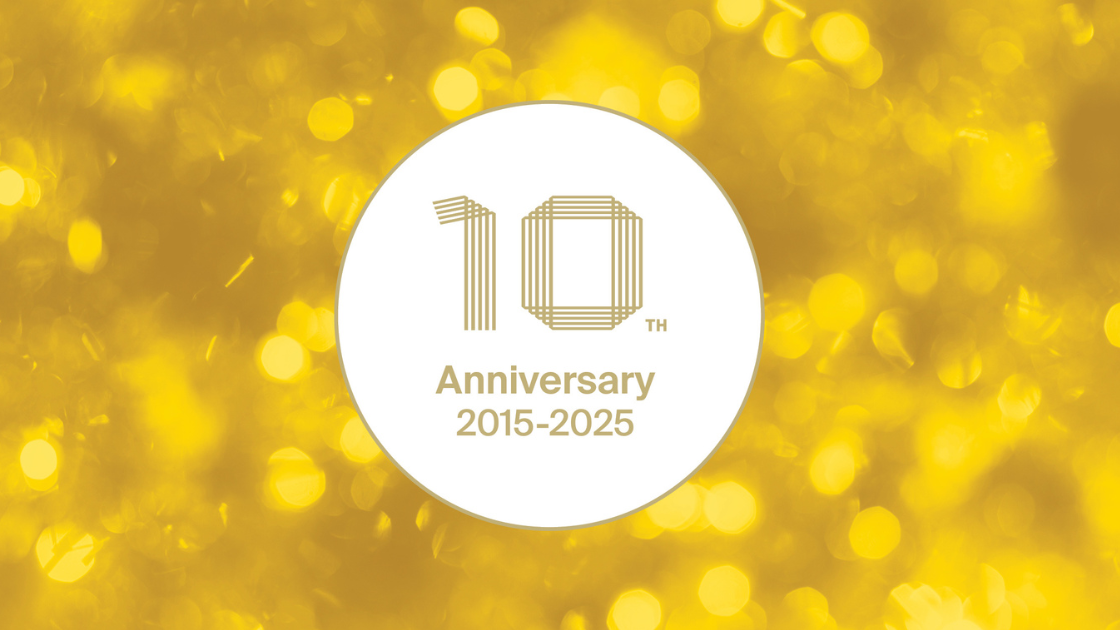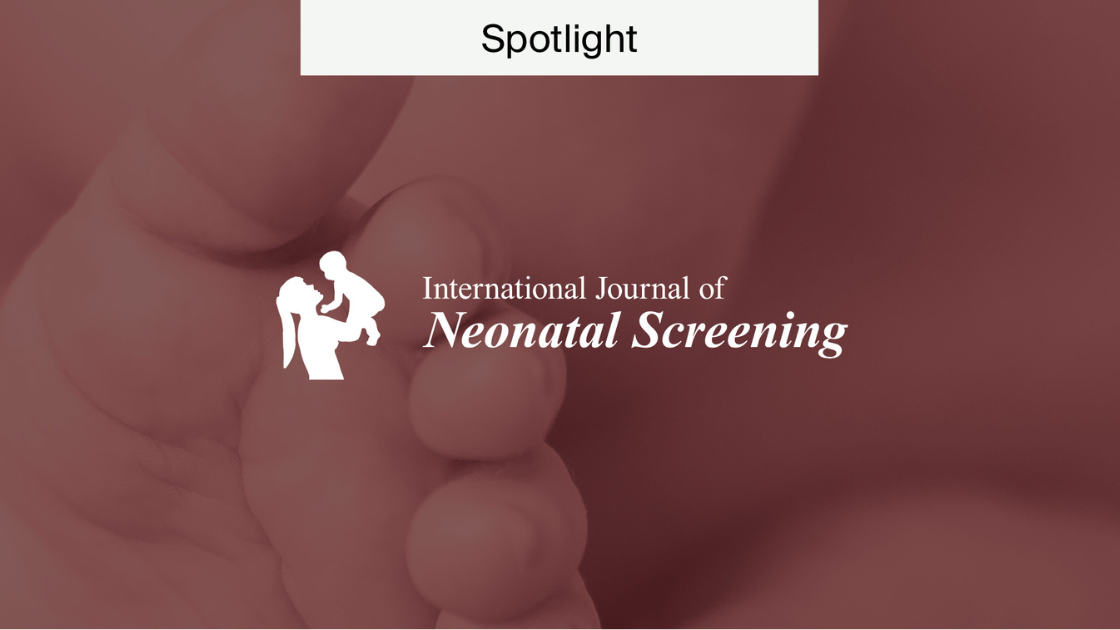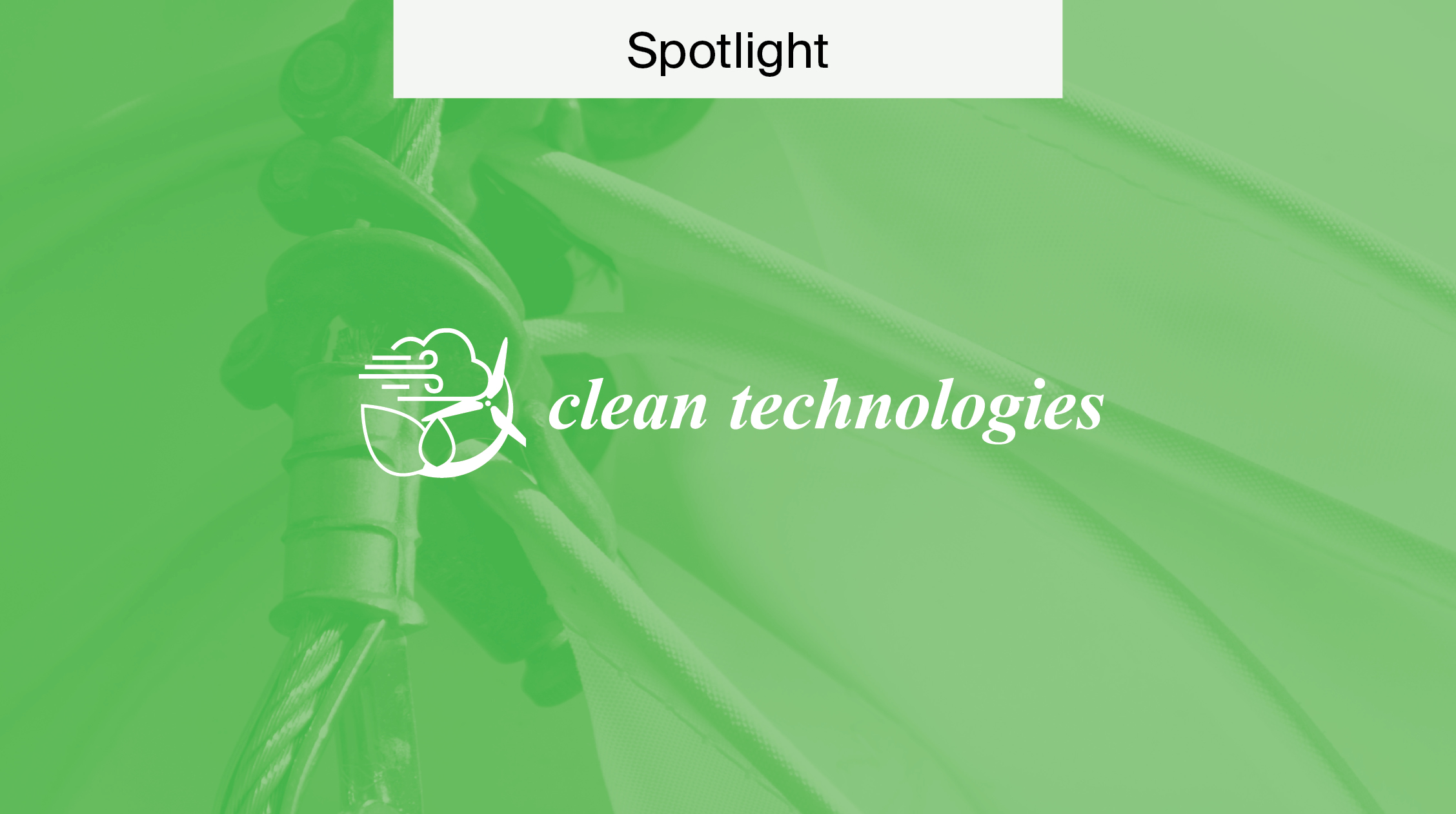
Clean Technologies MDPI: Journal Spotlight
With growing environmental concerns influencing a series of international sustainability targets, researchers across the globe are actively developing clean technologies.
This month, we’re putting Clean Technologies (ISSN 2571-8797) under our journal spotlight. Clean Technologies is an international, Open Access journal on technological development aiming to reduce the environmental impact of human activities.
Here, we cover the journal’s development and achievements which have contributed to its growing impact, alongside upcoming sustainability focused events.
Editor in Chief: Prof. Dr. Patricia Luis
Current Impact Factor: 4.7
Current CiteScore: 8.3
Statistics as of September 2025.
A history of Clean Technologies
Clean Technologies’ inaugural issue was released in 2019, led by its first Editor-in-Chief (EiC), Prof. Dr. Shaobin Wang, who enjoyed a brief stint at the journal’s most senior position between 2018 and 2019.
Following this, Prof. Dr. Patricia Luis would assume the position of EiC and has seen Clean Technologies through the past six years of publishing. A Professor at the University of Louvain-la-Neuve, Belgium, Dr. Luis’s research interests include sustainability, chemical engineering, membrane technology, CO2 capture, and life cycle assessment.
In 2021, Clean Technologies was indexed in ESCI (Clarivate), starting with Volume 1 (Issue 1). The following year, the journal was additionally indexed in Scopus (Elsevier).
Continuing to go from strength to strength, Clean Technologies would receive its first CiteScore (4.5) and Impact Factor (3.8) in 2023.
Since the journal began publishing research in 2019, its output has increased steadily, publishing 80 papers in 2024, up from 22 in 2019. Shown by its growing list of achievements, Clean Technologies continues to flourish into a premier platform for research on environmentally friendly technologies and resource consumption.

Prof. Dr. Patricia Luis, Editor-in-Chief (2019–present)
“I see Clean Technologies advancing with high-quality papers and a vision centered on sustainability and a healthy planet for all. Beyond publication objectives, we strive to demonstrate the real-world benefits of our research, particularly for future generations.” – Prof. Dr Patricia Luis.
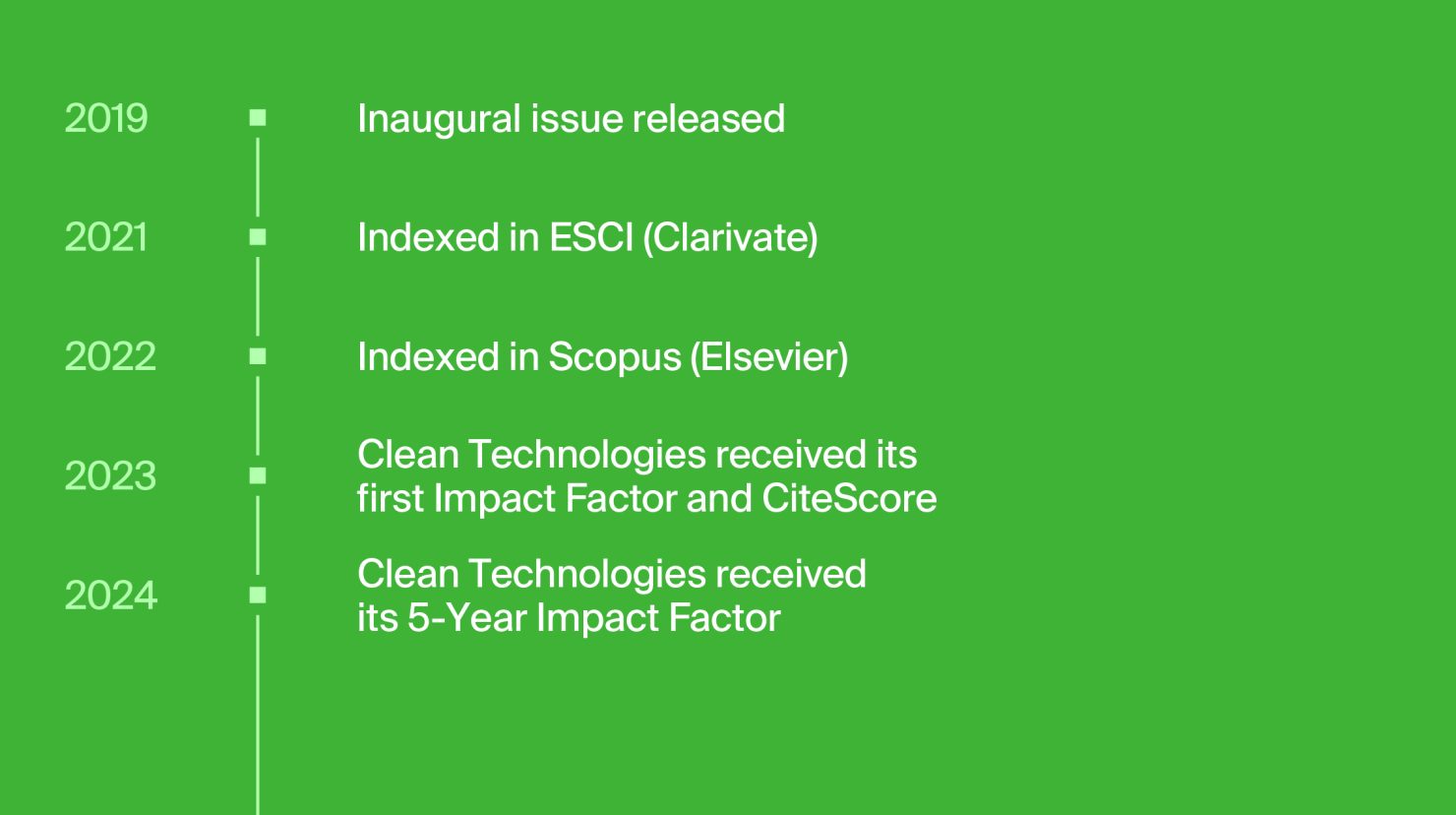
Aims and scope
In the journal’s first editorial piece, Prof. Dr. Wang cited the immense importance of maintaining sustainable development for industrial production amidst rapid global economic and technological development. From its inception, the mission of Clean Technologies was clear: to leverage high-quality Open Access research on the development of sustainable technologies and, consequently, a cleaner environment.
Across its reviews, research papers, Special Issues, and novel communications, the journal’s scope invites scientific discussion across a range of topics. Its scope includes, but is not exclusive to, clean and low-carbon energy, energy recovery, sustainable chemistry, and decarbonization of industry.
A full list of topics in the journal’s scope can be found here.
Journal metrics

The Clean Technologies publication which has received the most citations, as of September 2025, is a review article entitled ‘A Review of Technical Standards for Smart Cities’. The article, published in 2020, acknowledges a gap in the scientific literature exploring industry-wide technical standards for smart cities, arguing that consistency across requirements is essential to their development.
Journal Impact Factor (Journal Citation Report, Clarivate) measures the frequency with which the average article published in a journal has been cited in a yearly period. First receiving an Impact Factor of 3.8 in 2023, the journal has seen steady growth in this measurement, currently holding an Impact Factor of 4.7.
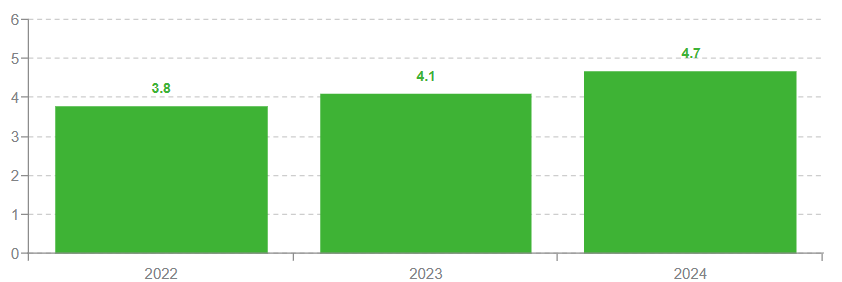
CiteScore (Scopus, Elsevier) similarly acts as a tool for calculating a journal’s scholarly impact, based on the average number of citations received over a certain period. Clean Technologies’ 2024 CiteScore sits at an impressive 8.3, building from a CiteScore of 6.1 for 2023, and 4.5 for 2022. By almost doubling its first CiteScore after only three years, these metrics continue to display the journals continuous improvement. Also, the journal ranks in Q1 for the CiteScore rankings ‘Environmental Science (miscellaneous)’ and ‘Global and Planetary Change’.
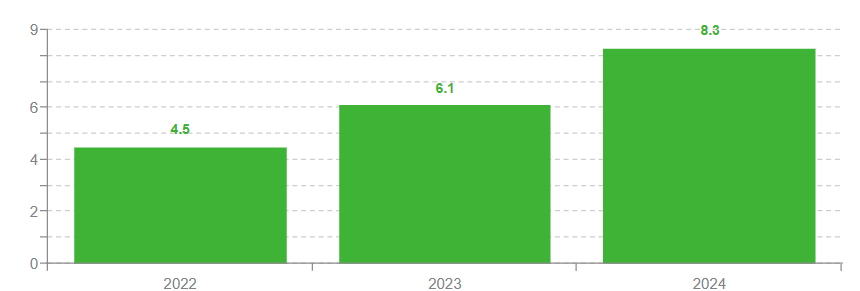
Clean Technologies is indexed within an extensive list of databases and archives, notably including Scopus (Elsevier), ESCI (Web of Science), and DOAJ. Find a comprehensive list of associated indexing services here.
As of September 2025, the journal has received 22 mentions across news and blog outputs, and over 300 mentions across social media. However, perhaps the most indicative of the journal’s success is its 28 mentions across policy documents, patents and guidelines.
A review published in Clean technologies of heavy-duty powertrain technologies has been cited by the European Union in inquiries into zero-emission heavy-duty transport. Also, a study of circular water economies was mentioned within EU policy frameworks advocating for a water resilient Europe. This recognition reflects the great impact of research in Clean Technologies and its contributions towards essential sustainability discourse.
The Clean Technologies community
Championing sustainability is a core value for MDPI, reflected in its ongoing commitment to the MDPI Sustainability Foundation and its portfolio of journals which provide an outlet for researchers to advance sustainable solutions for pressing environmental challenges.
The research in Clean Technologies speaks to an increasingly environmentally conscious and sustainability-driven scholarly community. The journal engages with its scholars through MDPI’s Awards programme and by hosting conferences and webinars.
Awards
Clean Technologies offers various awards to researchers in the field of Clean Technologies.
The two currently open Clean Technologies awards include the Best Paper Award (winner announcement: 31st October 2025) and the Outstanding Reviewer Award (winner announcement: 31st March 2026).
The journal also recently announced the winners for its Young Investigator Award and Best PhD Thesis Award.
Learn more about Clean Technologies awards here. Alternatively, you can read our article covering MDPI’s Award program.
Conferences
Clean Technologies will be represented at the upcoming 11th World Sustainability Forum (WSF), which will be held across the 2nd and 3rd October in Barcelona, Spain.
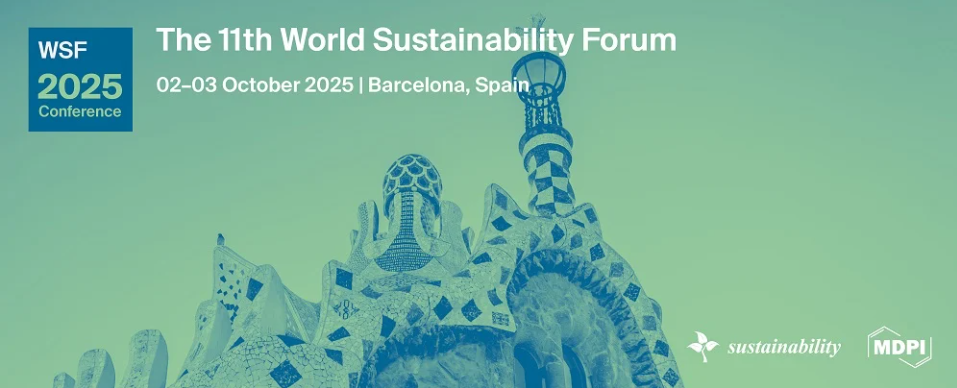
Organized by the MDPI Sustainability Foundation in collaboration with MDPI’s Sustainability journal, the event will bring together like-minded researchers, academics, and global leaders, driven by a collective desire to achieve a sustainable future.
This year’s event will be centred around the theme of Sustainable and Resilient Cities. Within this, discussion of clean technologies will hold much significance. The conference aims to promote the dissemination of groundbreaking research exploring topics such as urban resilience, renewable energy, and smart city innovations.
Read our article exploring the 11th World Sustainability Forum here.
Webinars
On the 25th of September 2025, Clean Technologies will hold its first webinar.
‘Clean Technologies for Sustainable Future’ will have two keynote speakers: Professor Laura Torrente Muricano from the University of Cambridge, UK, and Professor Gregory Scott Patience from Polytechnique Montreal, Canada.
Key topics to be discussed include green ammonia, renewable energy, fossil fuels, and the development of clean technologies for the future.
Webinars facilitate connection between scholars across the world, removing geographical barriers which may prevent researchers attending in-person conferences.
If you are interested in attending, or accessing the recording, you can find all the important details here.
Submitting a manuscript
Manuscripts for Clean Technologies should be submitted online at susy.mdpi.com. Prior to submitting, we recommend that authors explore the useful resources on our author guidelines webpage.
The submitting author, who is generally the corresponding author, is responsible for the manuscript during the submission and peer review process.
To submit your manuscript, register and login to the submission website. Once you have registered, click here to go to the submission form. All co-authors can see the manuscript details in the submission system if they register and login using the e-mail address provided during manuscript submission.
If you’d like to find out more about Clean Technologies and its publication process, please visit the journal website.
Stay up to date with Clean Technologies on social media:



